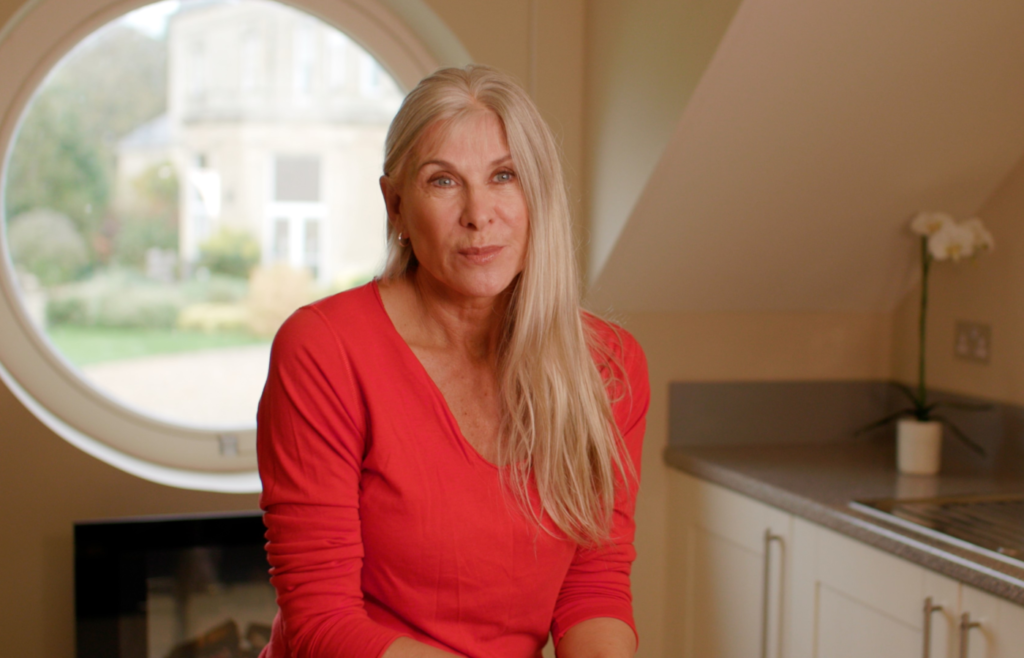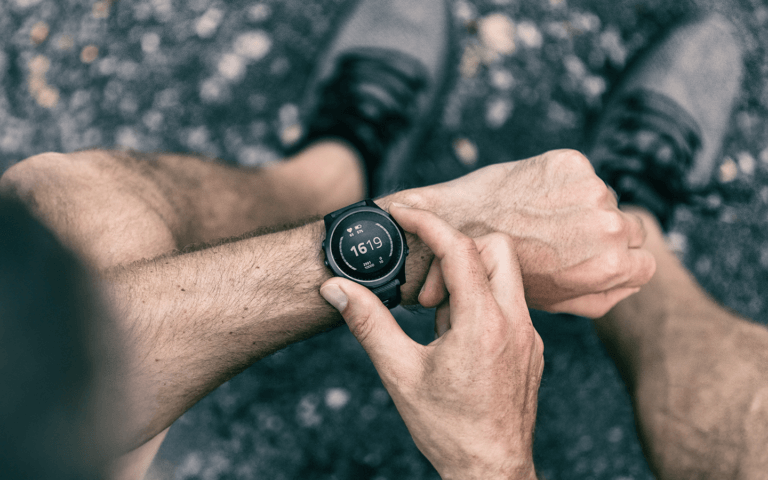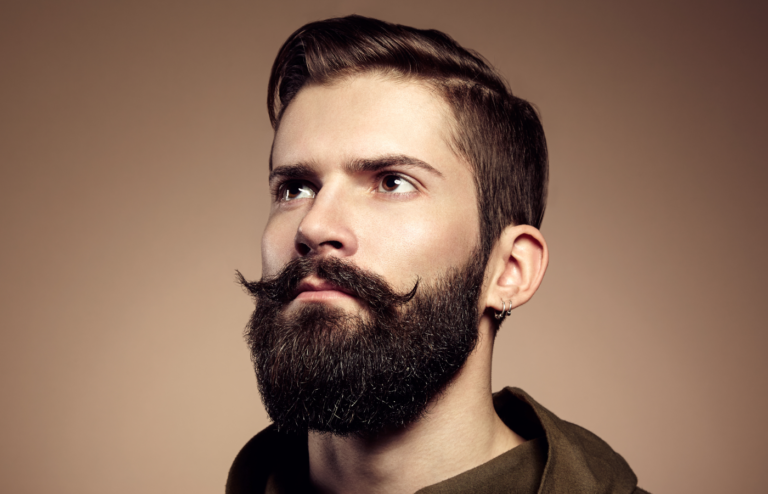Images Credit: John Dietrich
Imagine clocking up over 40,000 hours of serious training, winning Olympic medals, being awarded an MBE, hosting television shows, having a child at 44 and then casually welcoming your 61st birthday with the face and body of a 30-year-old model.
Sharron Davies did, and oh, by the way, that list is somewhat incomplete…
“I will take the compliment. I’m sure it’s all the strong lights; I work with strong lights these days.” Sharron laughs in response to my begging for beauty tips the moment she enters my Zoom room. I’m awestruck. The soon-to-be 61-year-old before my eyes is not human, surely. She genuinely looks half her biological age.
“I think it’s probably an accumulation of factors,” she continues. “I mean, I’ve exercised since I was a little girl. I’ve always eaten a healthy diet, and I don’t drink often. I try to eat colorful foods. I seldom drink alcohol, and I’ve never smoked. I live out in the countryside, try to get 6-8 hours of sleep per night, and I’m always running around after my kids and grandkids, which keeps me young. Also, I’m not going to lie; I do have “careful” Botox and go to see Annie Cartwright, MSc, at the skin and face clinic in Cardiff, who looks after me. But it’s always been really mild. I don’t want an ironing board forehead. I try not to eat late. I might have a cup of tea and a biscuit before I go to bed, but I don’t sit down and eat a “big” meal at eight o’clock at night. My last meal is usually around 6:30 pm.”
Beauty rundown complete, we were poised for the deep dive into Sharron’s time in the pool as one of the top swimmers on earth that manifested in a career as a model, TV host and prominent campaigner for fair competition.
Mission Unstoppable: the fight to remove misogyny from sports…
“The problem was, I wasn’t top because I was competing during the East German era and lost out on gold medals to doped athletes.”
“I have a good collection of international silver and bronzes”, says Sharron, as she recounts the tale of injustice she’s been forced to live with for decades. “It causes me a lot of frustration that nothing was done about it at the time, and nothing has been done since. I had friends who were 4th behind 3 East Germans; their whole lives were changed for the worse by cheating.”
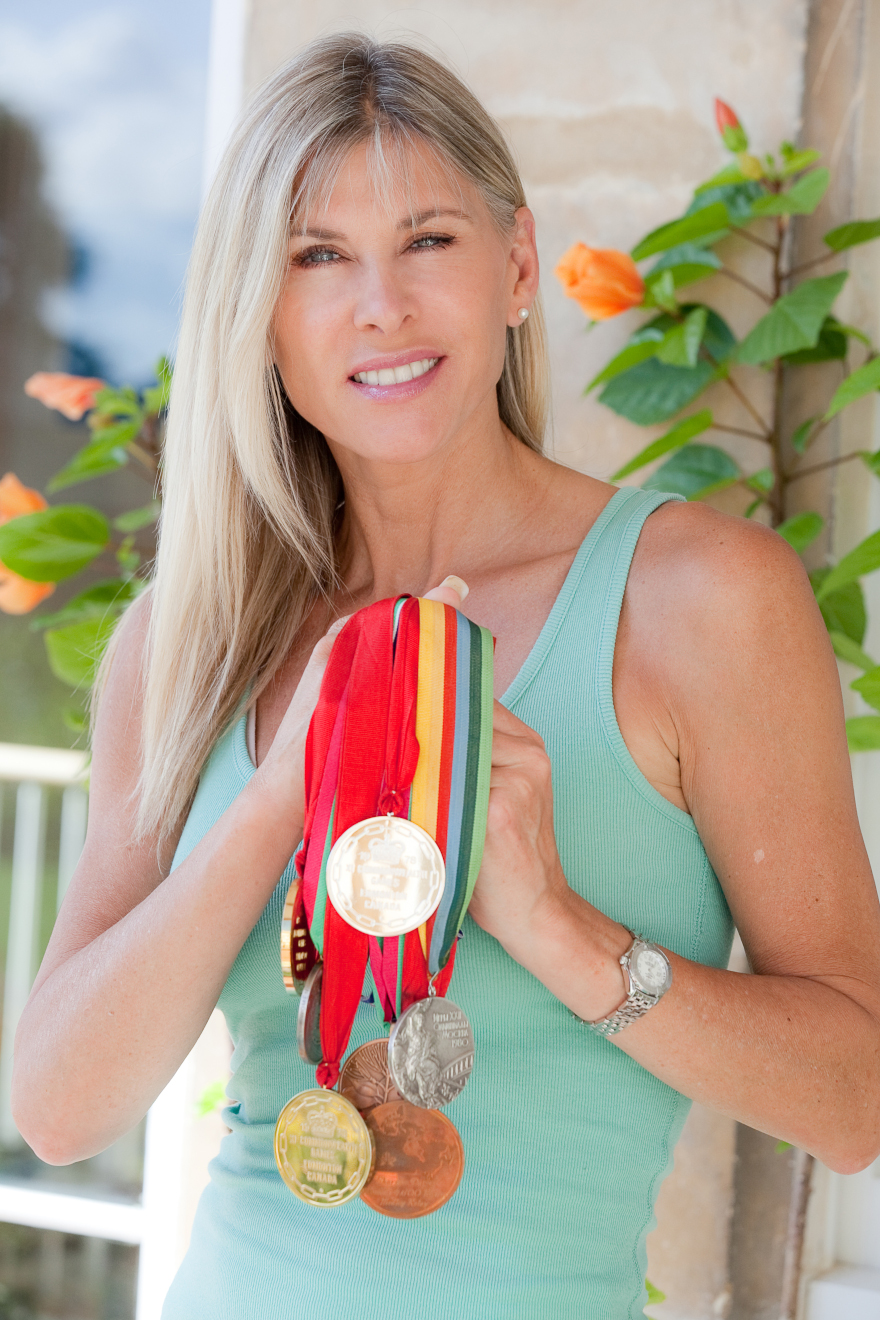
And today, by insisting on the inclusion of males in races created for females, rather than putting safety or fairness first, we’re literally asking young girls to start races with a known disadvantage against people who have had testosterone in their system all their lives.
“Removing testosterone does not remove the biological advantage. It might remove a very small part of it, but when we win races by tiny margins, it’s just ridiculously unfair. It’s as if what happened to my generation is happening again. But it’s worse now because it’s not just one nation or at an elite level; it’s everywhere. And that’s why I speak out.
“Making my views public comes at a great personal cost. It’s cost me a lot financially because cancellation culture exists; it absolutely does. And it has been extremely difficult.”
But I felt because I’d gone through that East Germany era the first time and nobody really spoke out for us, that I couldn’t sit by and watch a whole new generation of young girls lose out to something that was atrociously unfair. Not a single peer-reviewed study shows us that you can remove male puberty advantage. Trans-inclusion does not affect men’s sports; they are deemed still worthy of fair sport, whereas females no longer are. That’s simply not right.”
Having recently penned Unfair Play, a book that addresses the misogyny and battles females have had to endure in the sports world for decades, Sharron believes including biological males in women’s races will destroy the integrity of female sport. She has now embarked on mission unstoppable, as she argues we are not seeing female-to-male transgender athletes choose to compete against biological men for obvious reasons.
“The vast majority of female athletes who identify as men opt to keep racing with the women, which nobody has a problem with, providing they’re not taking testosterone,” says Sharron. “And that’s when the whole thing becomes extremely complicated, which is why my solution is the only logical one. We have to have a protected biological female classification and an open, inclusive category, and go back to sex screening, which existed right up until the ’90s and the vast majority of women still want, as was polled by the IOC who then chose to ignore that result.
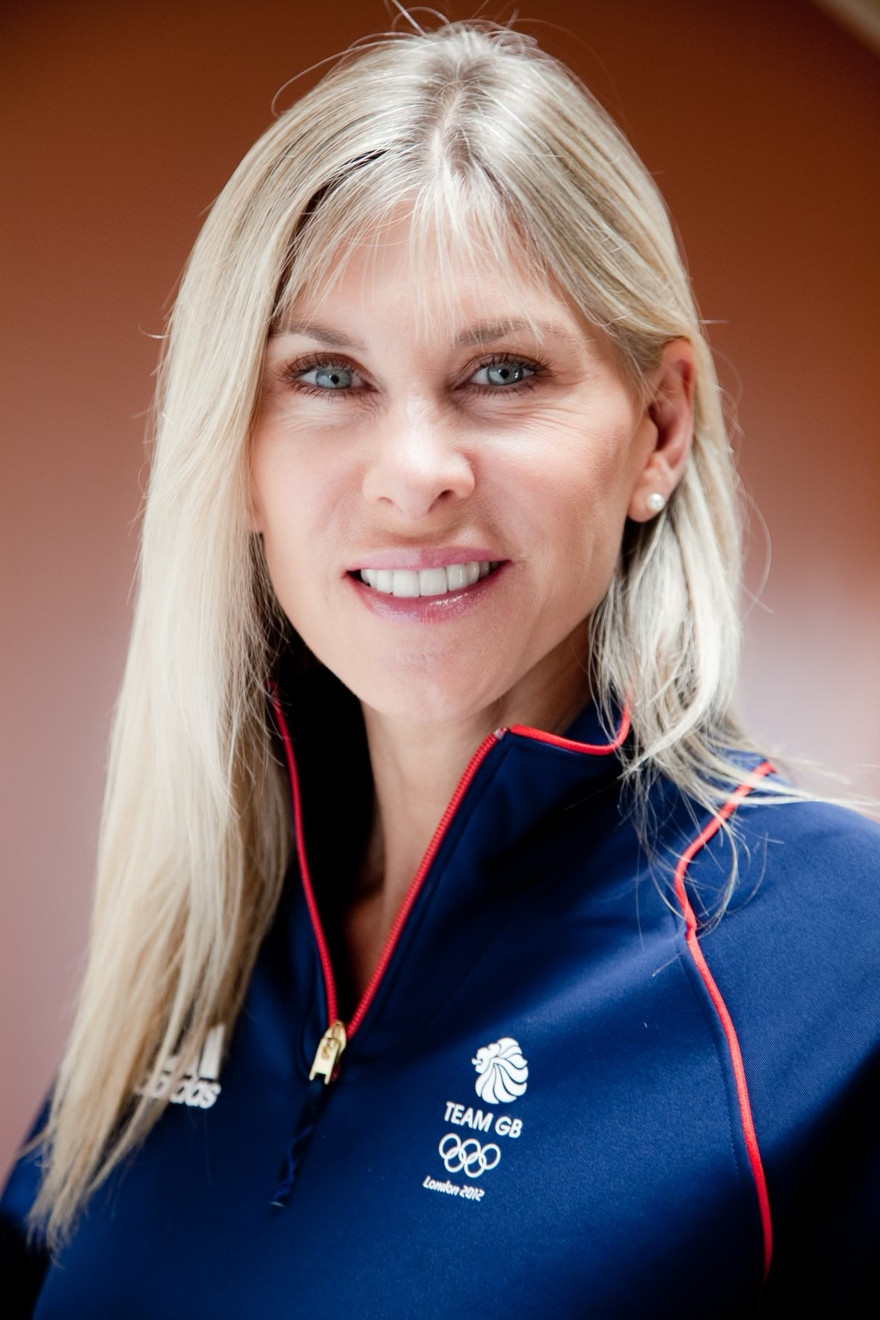
“Sadly, many transgender athletes don’t just want to compete. They want to compete with an unfair advantage. The likes of Lia Thomas went from being nearly 465th in America in men’s swimming to being number one by beating three USA Olympic silver medalists. That doesn’t happen because Lia Thomas all of a sudden has become unbelievably talented. That happens because it’s biologically unfair.
“After protecting the women’s category, thank goodness World Aquatics held a trial event at our World Grand Prix in Berlin at the beginning of October 2023. They created a category especially for transgender athletes to include them. Not a single person entered; that tells us a lot.
“What we’re also finding is we’re creating “non-binary” races with prize money. Humans are dimorphic like other mammals; there is no third sex, no matter how anyone identifies. People with a DSD are not on a spectrum; they are still male or female. So, now we have two classifications for males to win and one for women to compete in, except males can enter that too by identifying as a woman! So we have three races for males and none for females. All that happens is you have males that identify as non-binary winning the non-binary classification, men winning the men’s category, and the likes of Lia Thomas males winning the women’s races. Where do females get a fair race? It would be laughable if it wasn’t so tragic. That’s the sad truth of it. “Misogyny is still rife. It’s all about males and what they want.
“Unfair Play has been out since June. It’s just been short-listed for the William Hill Sports Book of the Year Award, which is very rewarding. The point of the book was to try to put all the peer-reviewed science and all the history there for everyone to see so people couldn’t be hoodwinked with emotional rhetoric over facts. The book is about the ongoing struggles for women’s sports. It covers sport’s terrible (and present) misogynistic history and the infamous East German era in incredible, horrifying depth. Those poor East German girls were treated like Guinea pigs for political gain, regardless of terrible physical long-term damage. We compete with our bodies, not our feelings. So, this is about trying to remove the emotion and just work with the peer-reviewed truth.”
“I believe everyone should be able to identify however they like, and of course, compete in a sport, but not at the expense of others. If you’re a male and you want to be really effeminate, you should be able to be safely. If you are a girl and you want to be masculine, you go for that, too. These are societal stereotypes, not biological sexes. Nobody should be criticizing you for your personal choices, how you want to present yourself and what makes you happy. That said, how short or long your hair is, how much makeup you wear or even what you wear is irrelevant to your actual biological sex. Human beings cannot change sex.”
How does a three-time Olympic athlete train today?
A testament to consistent healthy habits, Sharron recalls her dad wrapping her plastered broken arms, yes both of them, in Tesco’s plastic bags as a child who never stopped, and relives the years following teen retirement that saw her weight balloon as she rebelled against training.
This, she says, gives her an empathetic insight into the struggles of the clients she helps today through her online fitness programs, Sharron Davies Training, as both a qualified PT and a three-time Olympic medalist.
“I had a little blip when I first stopped swimming because I was used to training six hours a day since the age of 10,” she reveals. “I got to 18 and just needed a break. I stopped exercising but still had this huge appetite. I piled on about 30lbs! So, I’ve been there. I’ve been in that horrible place where you yo-yo diet and get infatuated with food. It was not a good place.”
Sharron says she now takes a non-fanatical, balanced approach to training but maintains a consistent and well-rounded routine.
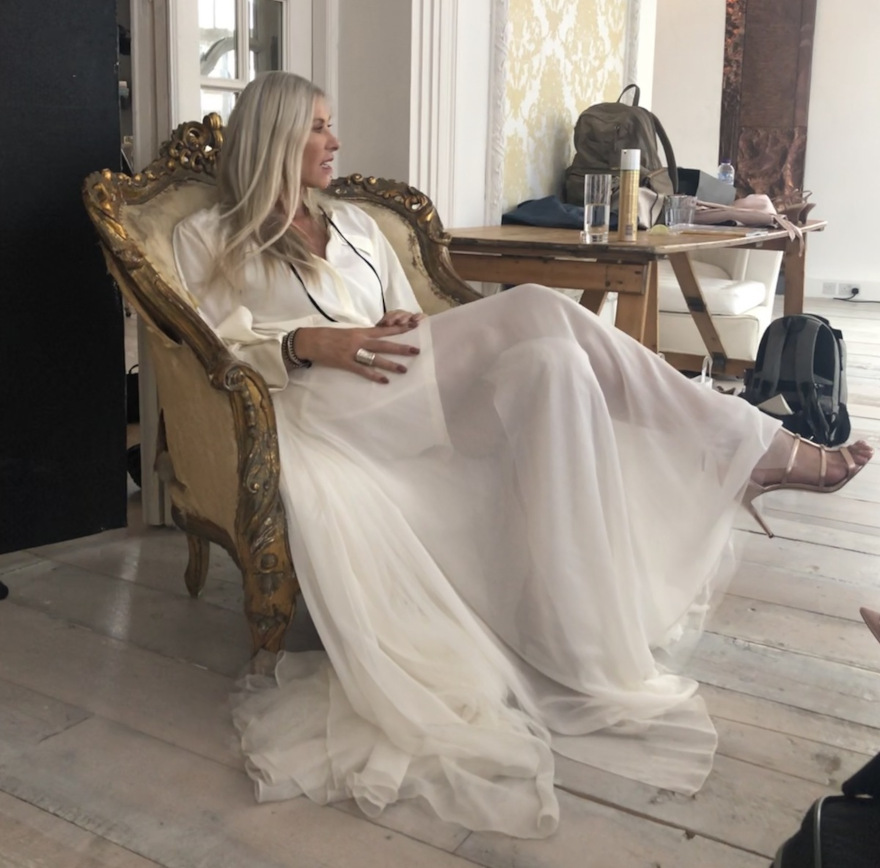
“Most of my training these days is in the gym,” she says. “I very rarely swim, purely because I have done so much of it. I was swimming for six hours a day for 20 years of my life. That’s a lot of time spent in the water, and my shoulders aren’t great. We wear out rotator cuffs traditionally.
“My gym workout is about an hour, three or four times a week. I do a 30-minute cardiovascular warmup usually, then 30 minutes of weights, including quite a lot of core. I like core. I believe it’s the center of our body and really important for balance (which is highly underrated as we age), plus back support. The secret of exercise is that you have to combine impact with weights and flexibility. There’s this myth that as we age, our metabolism slows down, but it really doesn’t if we work hard to maintain it. The problem is we tend to do less exercise as we age, and obviously our muscles atrophy over time. If we don’t maintain the muscles that burn calories, we’re not going to be able to eat so much food.
I’m not saying it’s easy juggling work, family life and training.
For me, impact exercise is the hardest thing because I’ve worn quite a few bits out. I hurt my right knee on a school sports day, leaving my foot in a pothole and doing a lot of damage, but I got away with it as a swimmer because I didn’t need to twist and turn my knees, though my legs had to be very strong to kick. I now have terrible arthritis in my right knee after finishing off my ACL during Gladiators in the mid-90s.
Back in the 70s, I’m not even sure we had MRI machines, so my dad tied my legs together, and for three months, I just pulled, after three months just kicking with my broken arms the year before.
“Thankfully, I found a treatment called Arthrosamid that has worked wonders for me. It was originally designed for horses to relieve their joint pain. Obviously, horses don’t pretend to be able to run, so I was impressed enough with the trials to give the treatment a try about a year ago. After my recovery, I made the journey over to the manufacturers in Denmark to see exactly how the whole thing worked and where it came from. It helps to break the cycle of pain from the Grade 4 arthritis I now suffer from. The product is a single hydrogel injection that works by cushioning the joint to relieve pain. It’s not a cure, but it definitely helps. I’m now more mobile and less uncomfortable. The great thing is, it’s not expensive, and it’s accessible to anyone.”
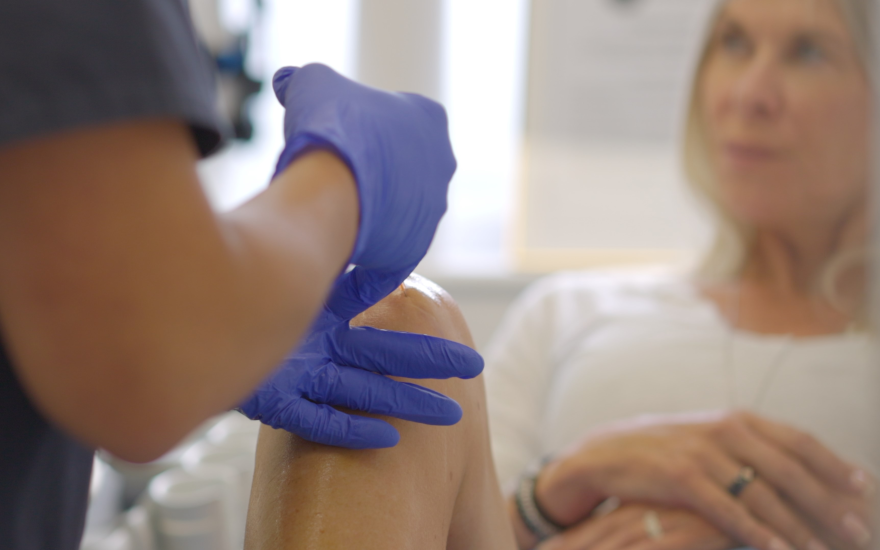
“Frustratingly, it was actually Gladiators that finished my right knee off after years of professional sport. A contender fell on it when I was doing a game called “Pyramid,” and whatever was left of the ACL just went. So, I had a reconstruction in ’95, which wasn’t very successful because they wanted me to go back to the show too quickly. It ended up being a lax repair and not as strong as it should have been.”
Gladiators…are you ready?
Sharron recounts her time on the primetime ITV show with fond memories, albeit after having her arm twisted by then-producer Nigel Lythgoe.
“I tried very hard not to be a Gladiator for quite a while,” reveals Sharron, smiling, who eventually signed up to be “Amazon”.
My husband at the time, Derek Redmond, was working on the show as a trainer, and I was presenting the kids’ series “Train 2 Win” with Daley Thompson. The producer kept saying, “Oh, Sharron, come on, be a Gladiator.” And I kept saying no because I was very happy being Sharron Davies, the swimmer.
“Ironically, I remember being in a supermarket and this youngster coming up to me. I could hear his mum and the little boy chatting, and the little boy was saying, “Oh, I’d like an autograph,” and the mum was saying, “I’m sure she’ll sign it; go and ask her.” So, the little boy came up to me and said, “Would you sign my paper, please?” I signed it. He walked away and said to his mum, “Who’s Sharron Davies?” I was heartbroken because Gladiators was amazing, but it’s a TV show. The Olympics is something you train for 15-plus years of your life for. Losing my Olympic identity was what I had been trying to avoid, but to that new young generation, I was a Gladiator, not a swimmer.
Sharron reveals her body consistently took a toll from the show.

“Gladiators was very intense because we would record two or three shows a day,” she reveals. “We filmed all the shows in one go during the summer holidays. It was then down to us to keep ourselves in decent condition for the rest of the year. The ’90s were a very really busy time as I had young children as well.
We’d get tremendous tendonitis in our forearms because everything was climbing, pulling or hanging. We were on so many anti-inflammatory medications we rattled. And there were games I hadn’t even practiced before they put us on a live show because there was no time. They literally said, “There you go.” But they always found time for us to get our skimpy outfits on with lots of hair flicking and makeup.
“I just wanted to train. I wanted to be the best I could be. There had to be a balancing act between the pantomime side and the competitive side. And the competitive aspect, for me, was more important than flicking my hair and wearing a tiny outfit. It was the way I was made.
However, it was an incredibly iconic show that really caught the imagination. I’m fascinated to see what the BBC has done because the health and safety aspect was what eventually took us off the air. It got to the point where people were getting really seriously injured. Today health and safety will not allow what we got away with in those days. So, it will be really interesting to see what they’ve done with it. I hope it might encourage people to be a bit more physically active and especially for kids to be inspired to be healthier.”
With each Gladiator meticulously adorned to act their given role, Sharron unmasks the prey behind the perceived predator.
“Wolf was always portrayed as the baddie, but actually he was a pussycat,” she reveals. “I mean, he really was. It was pantomime, and everybody had their favorites for whatever reason. I’ve kept in touch with Helen (Panther), Diane (Jet), Kate (Zodiac) and done a few events where I’ve seen some of the guys, which has been wonderful after 30 years, but it’s heartbreaking we lost Bernie (Falcon) to cancer this year; she was just the kindest person.”
The secret to eternal youth…
With a body to match her youthful facial features, Sharron details the long-running dietary habits responsible for wowing every woman on the planet.
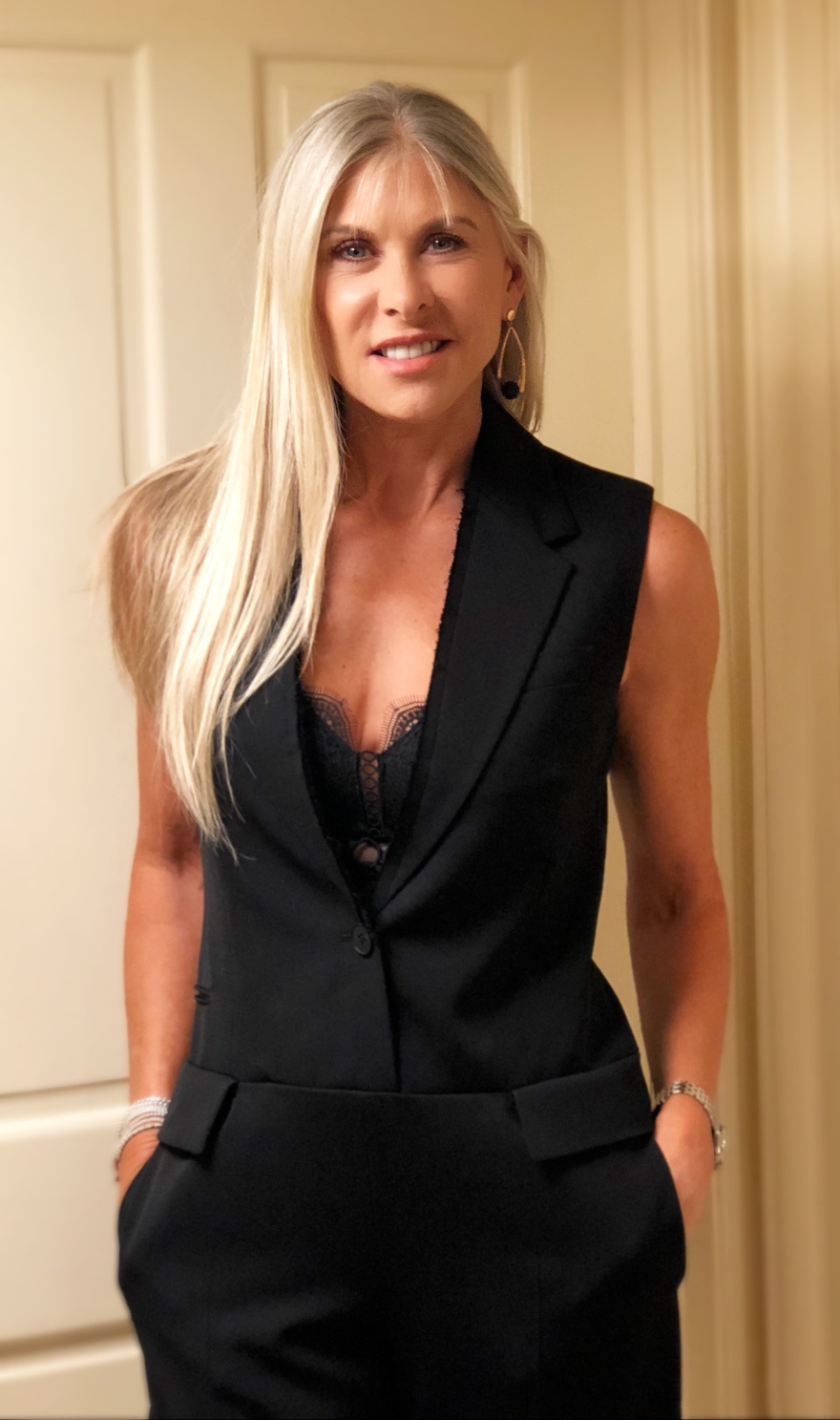
“I don’t eat a lot of meat,” she says. “I probably only eat red meat once or twice a week, but I do like a bacon sandwich every once in a while. And I’m a bit of a picker. I would probably struggle to eat a three-course meal, and I like to keep my energy levels going all day long. I think that comes from my swimming days. I’d always be carrying around a bag of nuts and raisins everywhere I went, and the moment I started to feel a bit of a dip, I’d dig in.
“I try to set the same healthy example for my kids where diet and exercise are concerned. Childhood habits stay with you, and sport not only teaches children amazing skills but also lays down these good healthy habits for life. It really worries me what’s happening to all our children with regard to not eating well, not exercising enough, and spending way too much time on gadgets and social media. Physical activity is also massively underrated for what it can do for our mental health. Living in the moment like sport makes us do is good for the soul.
“The sad truth of it is, kids mimic us. So, sorry, parents, if you want your kids to be healthy, you have to be active. If that takes a bit of an effort rather than plonking them in front of a gadget, then that’s what you have to do.
I have a little gym at home, and all of my kids have come in whilst I’ve been working out and picked up little one-kilo dumbbells. I’ve never given them a weights program, but they’ve just gone, “This is normal behavior. Mum’s jumping on a bike, mum’s lifting a weight, mum’s walking out with the dogs.” What they see is what they do. They copy me.”
Sharron has strong final words for those who are stuck to the sofa.
“Nobody really wants to be overweight and feeling unfit,” she insists. “Visceral fat will just sit around your internal organs, and your cholesterol levels will go through the roof if you have a bad diet.
If I said to you, “Here’s a magic pill, it’s going to cost you 500 quid,” you’d find the 500 quid, wouldn’t you? You wouldn’t turn around and go, “Ooh, no thanks, I’m happy being overweight so I’m not going to take it.” It’s just not true.
But unfortunately, there is no shortcut. It’s about determination, dedication, consistency and exercising when you really don’t want to do it. I believe that it takes about three months to make or break a habit and that first three months is the tough bit. Get yourself into that routine, get in that habit, and put that habit in with your kids, and you’ll be doing them a massive favor.
“I started Sharron Davies Training during COVID to help people get fit from home. I’m really proud of it. It’s plyometrics and exercises you can do using things you find around the house. You do four 15-minute workouts with me every week. It literally takes one hour of your time each week, which is nothing. We can all find that amount of time to invest in our health.
The other thing that I’m very heavily invested in these days is a company I bought shares in called “Paragon Structures”. We’ve lost a thousand pools in the last ten years in the UK and we’re working to try to replace as many as possible in a quick, green and economical way. It’s always areas of deprivation that are the worst affected. More kids are drowning, and fewer kids are swimming 25m when they leave primary school as they are supposed to. Swimming is not only a sport that saves lives, but it’s also a sport you can do from the cradle to the grave. It’s an important skill.”
Sharron’s journey to motherhood…
With three healthy children under her wing, Sharron recounts the grueling journey of conception she faced to eventually become mum to her youngest, 16-year-old Finley.
“I had eight rounds of IVF with three miscarriages to get Fin,” she says. “It’s a horrible process. I wouldn’t recommend it to anybody. You become so obsessed with your body, trying to listen to it, and then you feel such a failure when it’s not working the way you want it to. With the first two kids, it was easy. It was like shelling peas. “Oh, I’m pregnant. Oh, okay.” Whereas trying to become pregnant with Finley just wasn’t happening. Part of the difficulty was that I was older, of course, and I want people to understand that no matter how fit and healthy you think you are, the old biological clock does still tick. It was not fun, but he’s my little miracle. I had him when I was 44- insisting on a home water birth of course!”
Next year’s Olympics marks Sharron’s 13th consecutive Olympics. Having first competed in 1976 at the age of 13, she waved goodbye to her swimming cap in Barcelona aged 30 but has continued to host and conduct poolside interviews at every game since.
“Paris will be lovely because it’s the first time in a very long time the Olympics will take place in my time zone,” she smiles. This is going to be wonderful because it’s so close, so a lot of parents and friends will be able to go and watch their athletes. And it’ll be the usual BBC wall-to-wall coverage next year, so I’m looking forward to that too.”
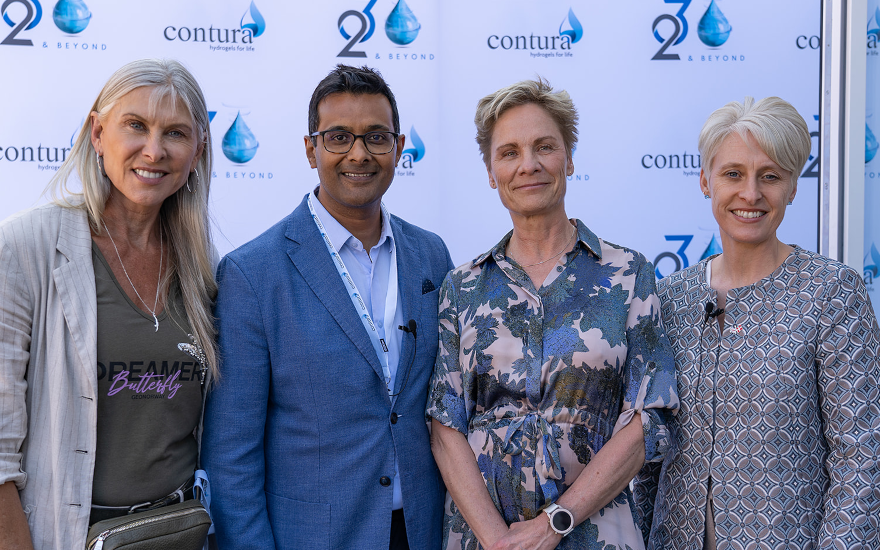
Sharron Davies MBE is an ambassador for Arthrosamid®, a single injection hydrogel to ease the pain and discomfort of knee osteoarthritis.

